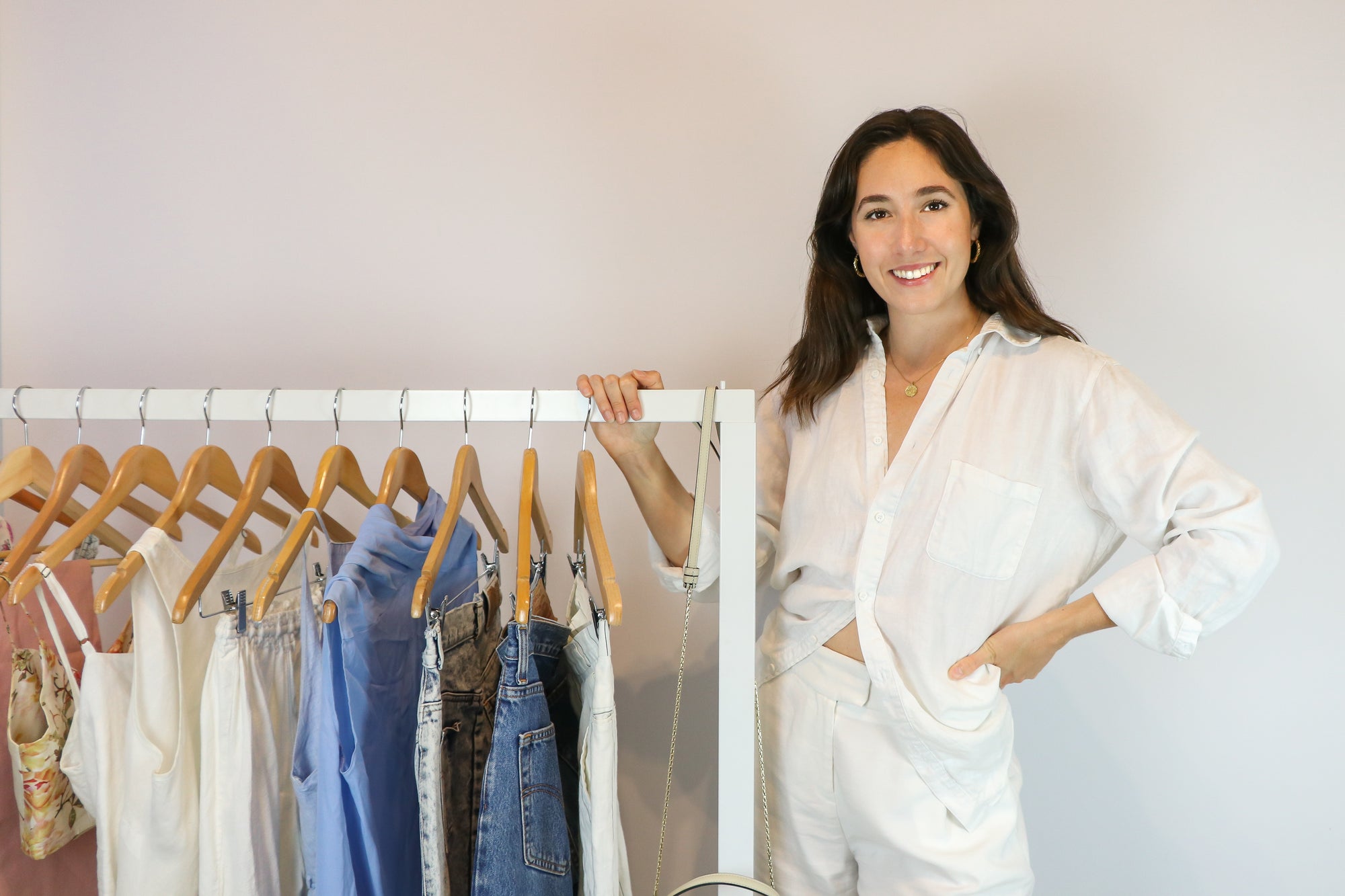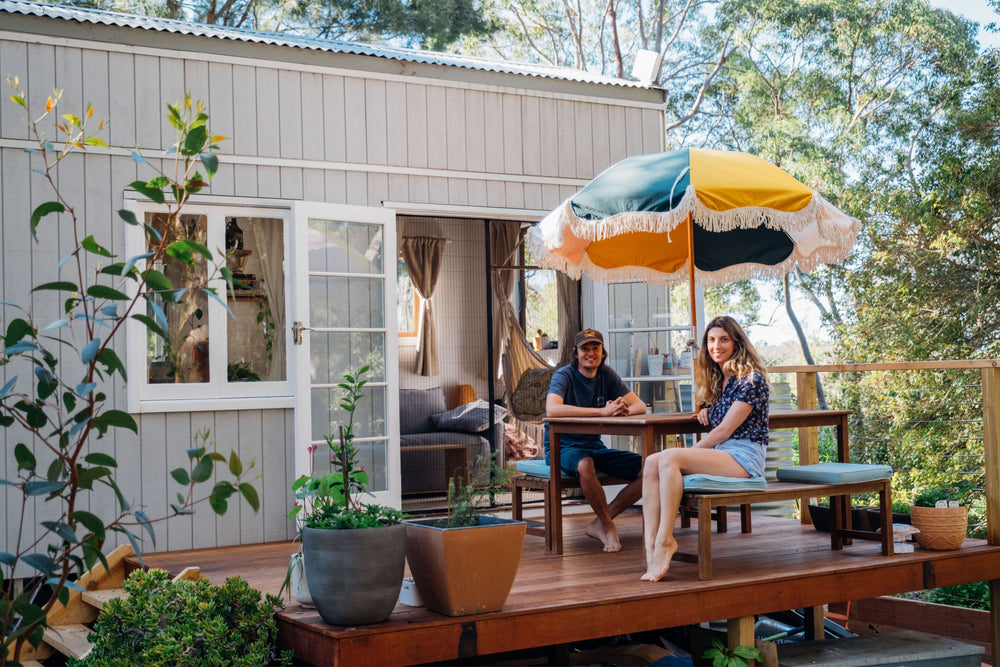
TELL US A BIT ABOUT YOURSELF, YOUR BACKGROUND AND WHY YOU STARTED HANDPIPPED VINTAGE?
Hi! Thanks for having me. My name is Pip Dracakis. I'm the founder/director of Handpipped Vintage. I’m a singer and actor by trade and have always worked in creative spaces. It’s probably that creativity that’s always drawn me to op shopping. I would be on a performance tour and just have to pop my head in at the local Vinnies. For me, wearing vintage is a way for me to express my individuality. I’m fascinated by the history, backstory and charm of finding something so unique, something that’s only yours.
Handpipped started as a passion project to justify my op shopping addiction but quickly turned into a fully-fledged online store once I realised the demand for quality second-hand. It felt like a very natural progression to set up shop and share my finds with the world. It is my mission to help reduce waste and inspire people to work a little vintage into their everyday wardrobe.

HOW DO YOU TYPICALLY SOURCE YOUR PRELOVED TREASURES FOR HANDPIPPED VINTAGE?
Did I mention my obsession with op shopping? But in all seriousness, it’s incredibly important to me that each Handpipped item is of the highest quality, which is why I prefer to source everything in person, by hand (as implied by the name!) Thanks to lockdown, I’ve had to come up with a few other ways to hunt down the gems, including buying from the community.
I recently launched a ‘Sell with Us’ campaign on Instagram where I connected with customers wanting to declutter items from their wardrobe. This has been a great way to keep the circular fashion carousel moving. You can sell your items with me by emailing pip@handpipped.com.
WHAT ARE SOME OF THE CHALLENGES YOU’VE EXPERIENCED OPERATING AND SUCCEEDING AS A SMALL, SUSTAINABLE BUSINESS?
There are a few!
One of the hardest things about running a small, sustainable biz is constantly wearing all the different hats. On any given day I could be the director, photographer, buyer, stylist, marketing strategist, seamstress, accountant and model. There seems to be a never ending to-do list and never enough time to tick everything off.
Having to turn down stock because a) I don’t have enough time to sell it or b) I don’t have enough room to store it. This does feel like an ethical dilemma because I hate worrying something will go to landfill.
Lately during lockdown, one of my main challenges is to manage my screen time. Selling on Instagram has its perks, but spending hours on social media is very draining.
I think when you’re a small business, It’s natural to want to grow and reach new customers. But as a sustainable business, I’m very mindful of not wanting to contribute to a mindset of overconsumption or impulse buying.
At the end of the day I try to stay true to my values of promoting slow, conscious consumption and focus on putting one foot in front of the other.
‘‘ASK YOURSELF, ‘DO I NEED THIS?’. ‘WILL I WEAR IT MORE THAN ONCE?’ ‘WILL I STILL WEAR IT NEXT YEAR?’’

WHAT ARE SOME OF YOUR TOP TIPS FOR BUYING SUSTAINABLE FASHION?
Here are my top tips:
- I think shopping sustainably is all about buying less and buying better. Invest in well-made foundation pieces with a lot of life left in them - staples such as a white cotton tee, vintage denim and a vintage blazer. Items that you know you can wear in multiple ways with other items in your wardrobe.
- Ask yourself, ‘do I need this?’. ‘Will I wear it more than once?’ ‘Will I still wear it next year?’ If the answer is no, then chances are it’s not going to be a very sustainable purchase.
- Get to know your measurements. In order to shop secondhand online with confidence, measure an item of clothing that you already own that fits you well. Save the waist, hip, bust and shoulder measurements in your phone so you’re ready to pounce at the time of a vintage drop
- One of my top op shopping tips is to feel for the quality of the garment and always check the laundry tag for the composition of the material. Where possible opt for natural fibres such as linen, cotton, silk and wool and avoid synthetics, as they release harmful toxins into the ocean and air with every wash.
- If you can shop locally and support small businesses then that’s a bonus! It helps reduce the impact of having items travel over long distances, often in aircraft.
- Look for brands that are giving back to the planet in some way. For example, this spring, Handpipped is partnering with One Tree Planted. For every item sold, one tree will be planted on your behalf. This way, you’re lowering your footprint and breathing new life into an existing treasure while you’re at it.
WHAT’S NEXT FOR HANDPIPPED VINTAGE?
I can’t wait to get on the road again and start sourcing regionally. My partner Nic and I love going on road trips, soaking up the countryside and sneaking in a few wine tastings along the way. I have some pretty special drops planned, collections that I have been saving up to shoot on location. I’d also love to do a beaches market up the north coast of NSW and take Handpipped on the road for a bit.
I love connecting with other small business owners. I have some very exciting collaborations in the works including a commission with Yuin Nation fashion designer, Katie Jarrett who will be upcycling some thrifted fabric into a bespoke Handpipped creation. I am also excited to reveal my plans to introduce some new lines. Menswear, homewares, children’s clothing and an archive line… Stay tuned.
TO SUPPORT LOCAL, FOLLOW @HANDPIPPEDVINTAGE ON INSTAGRAM AND SEE THE LATEST SPRING FINDS ON HANDPIPPED.COM.


